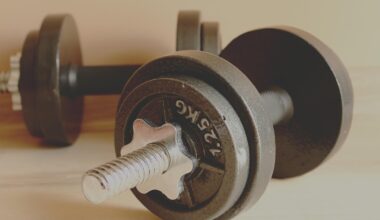Collagen and Its Role in Preventing Sports Injuries
Collagen is an essential protein that makes up a significant part of our connective tissues, including those found in joints, tendons, and ligaments. Athletes often put their bodies through rigorous physical activity, which can ultimately lead to injuries, particularly in the joints. Consuming collagen supplements can aid in strengthening these connective tissues and potentially help in preventing injuries. This is particularly beneficial for high-impact sports where the risk of joint strain significantly increases. Furthermore, collagen has been shown to improve joint flexibility and reduce pain associated with physical activity. The body’s natural collagen production decreases as we age, making supplementation even more crucial for older athletes or those undergoing intense training. Regular intake may support quicker recovery times post-injury and help athletes maintain optimal performance levels. Additionally, collagen supplements are often available in various forms, such as powders or capsules, making them accessible and convenient for athletes at all levels. Incorporating collagen into a balanced diet can be a preventive measure against injuries, making it a popular choice among sports nutrition products.
Types of Collagen and Their Benefits
Collagen exists in several forms, with Type I, II, and III being the most common in the human body. Type I collagen supports skin, bones, and tendons, while Type II is primarily found in cartilage and is essential for joint health. Athletes often focus on Type II for its ability to help maintain joint integrity, especially across repetitive motion sports like running or cycling. On the other hand, Type III collagen plays a supportive role in tissue structure and is typically found alongside Type I in the body. When selecting collagen supplements, it’s crucial to identify the type that aligns with your specific needs as an athlete. For those focusing on joint health and injury prevention, choosing a supplement with a higher concentration of Type II collagen can offer targeted benefits. The bioavailability of collagen also matters; hydrolyzed collagen, or collagen peptides, is better absorbed by the body, ensuring athletes maximize the benefits. Consumption should ideally be paired with vitamin C, which aids in collagen synthesis, thus enhancing the overall efficacy.
Collagen Supplementation Strategy
When planning to incorporate collagen supplements into your routine, understanding the best practices for dosage and timing is essential. Most studies suggest a daily dosage ranging from 10 to 15 grams to yield optimal results regarding joint health and injury prevention. Consistency is the key; it may take several weeks to notice significant changes in joint pain or flexibility, so regular consumption is important. Many athletes choose to mix collagen powder into their post-workout shakes or morning smoothies for convenience. To maximize benefits, it’s wise to combine collagen with other nutrients that support joint health such as Omega-3 fatty acids, which can help reduce inflammation, or glucosamine and chondroitin, both of which are known for supporting cartilage health. Furthermore, maintaining a balanced diet rich in antioxidants can aid in optimizing recovery and reducing oxidative stress. Overall, a comprehensive approach will not only enhance the effectiveness of collagen but also support overall athletic performance and longevity, allowing athletes to train smarter and safer.
Collagen’s Impact on Recovery
Recovery time is a crucial aspect of an athlete’s training cycle. When an athlete sustains an injury, the body needs the right resources to heal, which is where collagen’s role becomes vital. Research suggests that collagen supplementation may significantly speed up recovery by assisting in tissue repair and reducing the time needed to return to competitive activities. Specifically, studies indicate that athletes who take collagen supplements experience less joint pain during recovery periods compared to those who do not. This attribute makes collagen an appealing option for athletes specializing in high-contact sports where injuries are more prevalent. Furthermore, collagen helps in promoting a healthier inflammatory response, leading to reduced soreness and improved mobility post-injury. By incorporating collagen into their recovery strategy, athletes can ensure they are not only healing properly but also minimizing the risk of future injuries. Whether taken as a standalone supplement or combined with other recovery aids, collagen can provide the necessary support for athletes looking to maintain an edge in their training and competitive schedules.
Joint Health Beyond Collagen
While collagen offers several advantages in terms of joint health and injury prevention, it is essential to consider it as part of a complete joint health strategy. Other dietary supplements, such as glucosamine and chondroitin, should also be included for comprehensive support. Glucosamine aids in maintaining cartilage structure, while chondroitin helps with the absorption of nutrients into cartilage. These synergistic effects can enhance overall joint health and support mobility, particularly as athletes age or experience wear and tear from their sports routines. Moreover, ensuring that the diet includes adequate protein, vitamins, and minerals is critical, as deficiencies in essential nutrients can weaken connective tissues and exacerbate injury risks. Staying hydrated is equally important, as water aids in joint lubrication and overall health. Incorporating strength training, flexibility exercises, and proper stretching routines can also play a role in improving joint stability and reducing injury chances. Together, these combined strategies create a more holistic approach to sports injury prevention, providing athletes with the tools needed to perform at their best.
Potential Side Effects of Collagen Supplements
Collagen supplementation is generally considered safe for most individuals, including athletes. However, some people may experience gastrointestinal discomfort, such as bloating or diarrhea, particularly when starting a new supplement. It is advisable to start with a lower dosage, gradually increasing to the recommended daily intake as the body adjusts. Additionally, individuals with allergies to certain collagen sources like fish or bovine may find adverse reactions, emphasizing the importance of reading labels carefully. Pregnant or nursing women should consult healthcare professionals before beginning any supplementation. It’s also essential for athletes to understand that while collagen can aid joint health, it is not a substitute for a balanced diet or proper exercise regimen. Instead, it should be seen as an enhancement to an already solid foundation involving proper nutrition and appropriate training techniques. Staying educated about potential side effects and ensuring that they align with an athlete’s overall health plan enables safer and more effective integration into their daily routines.
Conclusion: Embracing Collagen for Optimal Performance
In summary, collagen supplements can play a vital role in promoting joint health and preventing sports injuries for both amateur and professional athletes. The benefits of collagen extend beyond merely preventing injuries; they encompass overall connective tissue health, quicker recovery times, and enhanced performance. For athletes looking to maintain high levels of activity, integrating collagen into their nutrition strategies can be a valuable asset. By choosing the right collagen types suited for their individual needs and maintaining a consistent intake, athletes can bolster their joint health and extend their training years. Sports professionals considering supplementation should utilize knowledge of dosage, timing, and complementary nutrients for an optimal approach. Emphasizing recovery, injury prevention, and overall performance through a balanced diet and appropriate training regimens is paramount. Collagen supplements present a pivotal opportunity for athletes to stay ahead in their performance game. By embracing collagen as a part of their sports nutrition routine, they can enhance both their enjoyment and longevity in their sport, reaping lasting benefits.
Importance of Educating Athletes and Coaches
Education around collagen and its benefits is essential for athletes and coaches alike. Understanding the role of collagen in joint health and injury prevention will enable athletes to make informed decisions about their nutrition and supplementation choices. Coaches can greatly influence an athlete’s training regimen by emphasizing the importance of nutrition, including effective use of supplements like collagen. Educational workshops, seminars, and proactive dialogue regarding sports nutrition can create lasting changes within teams and sports organizations. Engaging athletes in discussions about how supplements like collagen fit into their overall wellness can foster a culture that prioritizes health and injury prevention. Furthermore, knowledge transfer about the potential side effects and the important concept of a holistic approach to joint care is crucial in sports settings. With increased awareness, athletes can adopt optimal practices that elevate their performance, synchronize recovery options, and mitigate injury risks. Coaches have a responsibility to create an environment where nutrition and supplementation are part of the conversation, ultimately influencing athletes to take their joint health seriously for improved athletic longevity and performance outcomes.





